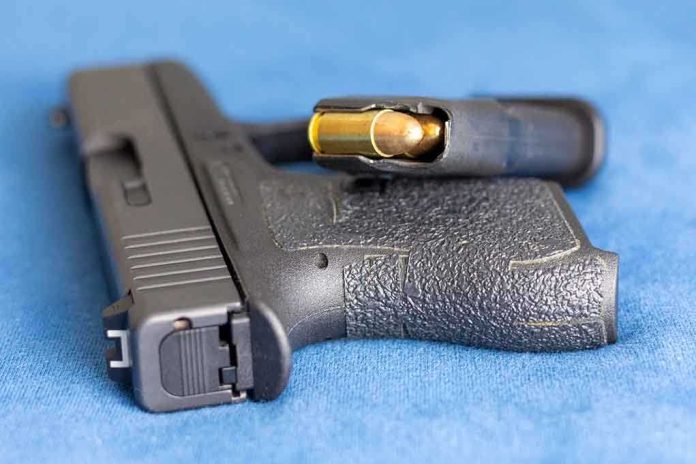
Trump administration dismantles Biden’s “Zero Tolerance” gun policy, marking a decisive victory for Second Amendment advocates while critics fear impacts on public safety.
Key Takeaways
- The Department of Justice and ATF have officially repealed the “Zero Tolerance” policy that revoked licenses of gun dealers for violations, a policy implemented under Biden in 2021.
- Under the now-terminated policy, over 1,000 dealers were cited for serious violations, with 642 licenses revoked or voluntarily surrendered.
- Gun rights organizations, including the National Shooting Sports Foundation and Gun Owners of America, celebrated the repeal as a major Second Amendment victory.
- The Department of Government Efficiency (DOGE) is expected to play a key role in further reforming ATF policies and procedures.
- Critics argue the policy reversal could undermine public safety by allowing problematic gun dealers to continue operating.
Trump Administration Rolls Back Biden-Era Gun Dealer Enforcement
In a significant policy shift, the Trump administration has officially terminated the Bureau of Alcohol, Tobacco, Firearms, and Explosives’ “Zero Tolerance” policy that targeted gun dealers for violations of federal firearms laws. The policy, originally implemented by the Biden administration in June 2021, had empowered the ATF to revoke licenses from Federal Firearms Licensees (FFLs) who committed willful violations such as failing to conduct background checks, falsifying records, or transferring firearms to prohibited persons. This reversal represents a substantial win for gun rights advocates who viewed the policy as government overreach.
“For years, the Zero Tolerance Policy has been a tool of political retribution, targeting gun stores and Americans who were simply trying to exercise their rights. We applaud President Trump, Attorney General Bondi, and Director Kash Patel for listening to gun owners and taking action to repeal this abusive policy. This is what pro-gun leadership looks like,” said Erich Pratt, Senior Vice President of Gun Owners of America.
The National Shooting Sports Foundation (NSSF), which described itself as “working with the Trump administration to secure this critical industry victory since the first day of the president’s second term,” had consistently opposed the policy, characterizing it as “a blunt instrument to hobble the firearm industry.” Gun rights organizations argued that the policy unfairly penalized dealers for what they termed “minor infractions” rather than focusing on genuine criminal activity.
DOGE’s Anticipated Role in ATF Reform
President Trump’s Department of Government Efficiency (DOGE) is expected to play a central role in further reforming the ATF’s approach to regulation and enforcement. Conservative advocates have suggested that DOGE should recommend several changes to bring the bureau back in line with its core mission of enforcing federal laws while respecting constitutional rights. These recommendations include advising President Trump to sign executive actions preventing the ATF from unilaterally rewriting gun control laws and ensuring the bureau treats law-abiding gun owners with appropriate respect.
“Under President Trump’s leadership, we’re seeing a realignment toward the Constitution. This repeal and regulatory review of ATF’s ‘Zero Tolerance’ Policy sends a clear message that the era of Biden gun control is over. GOA is grateful for the administration’s commitment to restoring Second Amendment rights and standing with law-abiding gun owners nationwide,” said Aidan Johnston, Director of Federal Affairs for Gun Owners of America.
The Trump administration’s so-called DOGE agency is scrapping over 50 ATF rules, making it easier for gun traffickers and violent criminals to slip through the cracks. From Prince George’s County to every corner of the country, we need stronger enforcement—not weaker rules.… pic.twitter.com/Oz86CZ6zD2
— Rep. Glenn Ivey (@RepGlennIvey) June 27, 2025
Impact on Public Safety Concerns
While Second Amendment supporters celebrate this policy reversal, gun safety advocates express serious concerns about its potential impact on public safety. Under the now-rescinded policy, ATF inspections had increased significantly, with evidence suggesting the bureau was effectively identifying dealers who repeatedly violated federal laws. Data shows that of the more than 1,000 dealers cited for serious violations, 642 had their licenses either revoked or voluntarily surrendered rather than face enforcement action.
The policy’s effectiveness is further demonstrated by the fact that only a small percentage (0.14%) of all Federal Firearms Licensees ultimately lost their licenses annually under the heightened enforcement. Examples of violations that led to license revocation included dealers failing to maintain proper records, selling firearms without licenses, and transferring guns without conducting required background checks—actions that critics argue directly impact public safety by potentially allowing firearms to reach prohibited individuals.
Future Direction of Federal Firearms Regulation
The repeal of the Zero Tolerance policy signals a broader shift in how the federal government will approach firearms regulation under the Trump administration. Attorney General Pam Bondi and Acting ATF and FBI Director Kash Patel are leading this transformation, with support from gun rights organizations that have been filing lawsuits against ATF policies they viewed as overreaching. Additional reforms under consideration include revoking specific ATF rules on frame or receiver definitions, arm braces, and ending import bans on semi-automatic long guns.
“The mission of the ATF is to conduct investigations utilizing their unique expertise, partnerships, and intelligence to enhance public safety by enforcing the laws and regulations and upholding the Constitution of the United States of America,” states the Department of Justice, emphasizing the need for balance between enforcement and constitutional rights. This mission statement now appears to be guiding a recalibration of the bureau’s approach under Trump’s direction, with DOGE potentially playing a pivotal role in reshaping how federal agencies interact with the firearms industry and gun owners.




